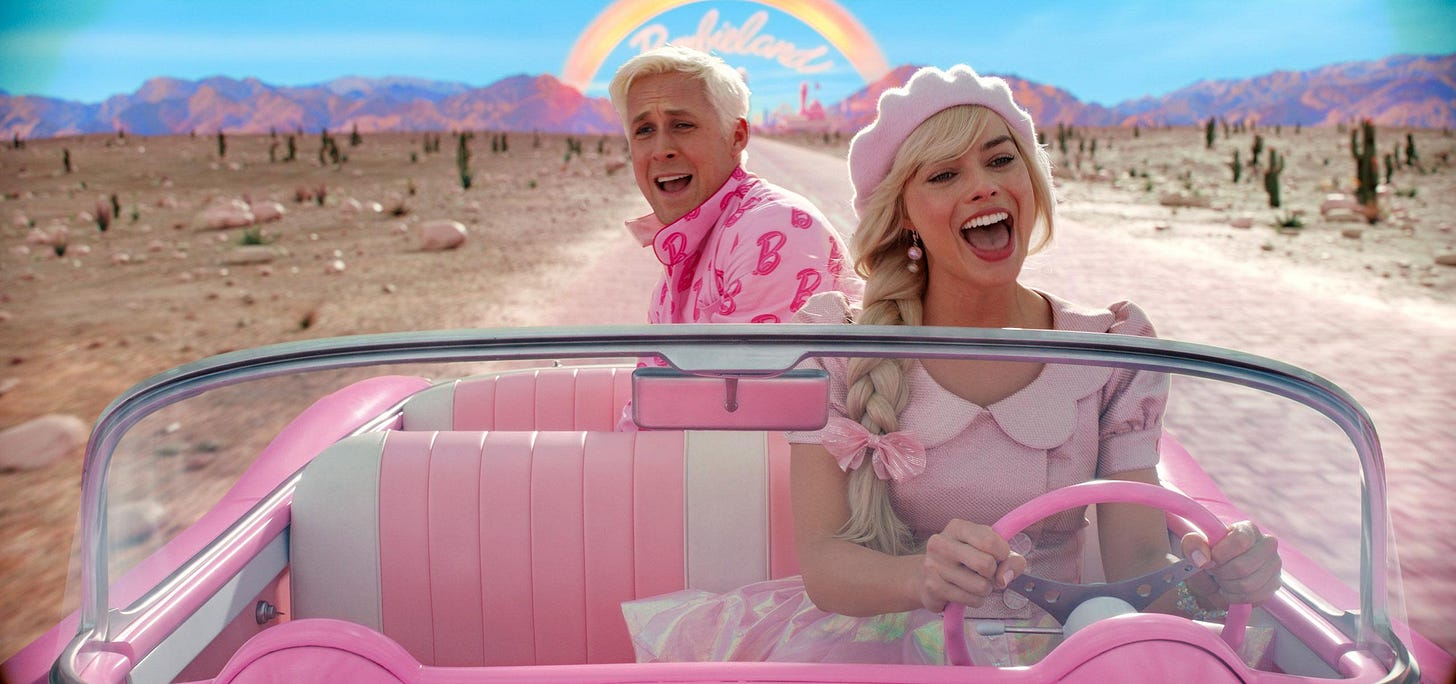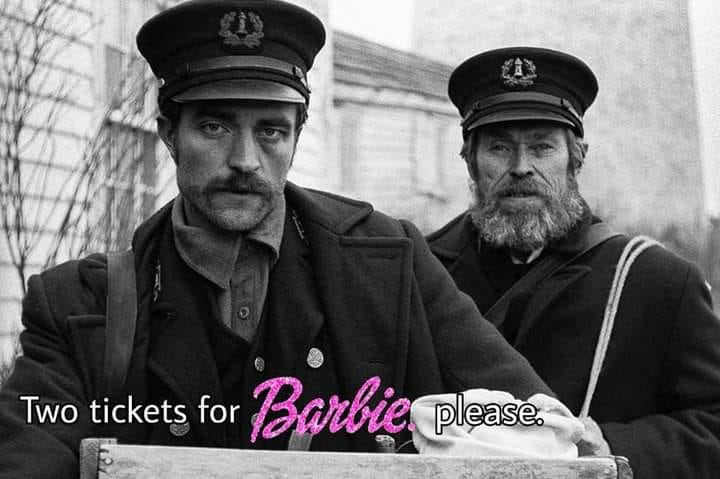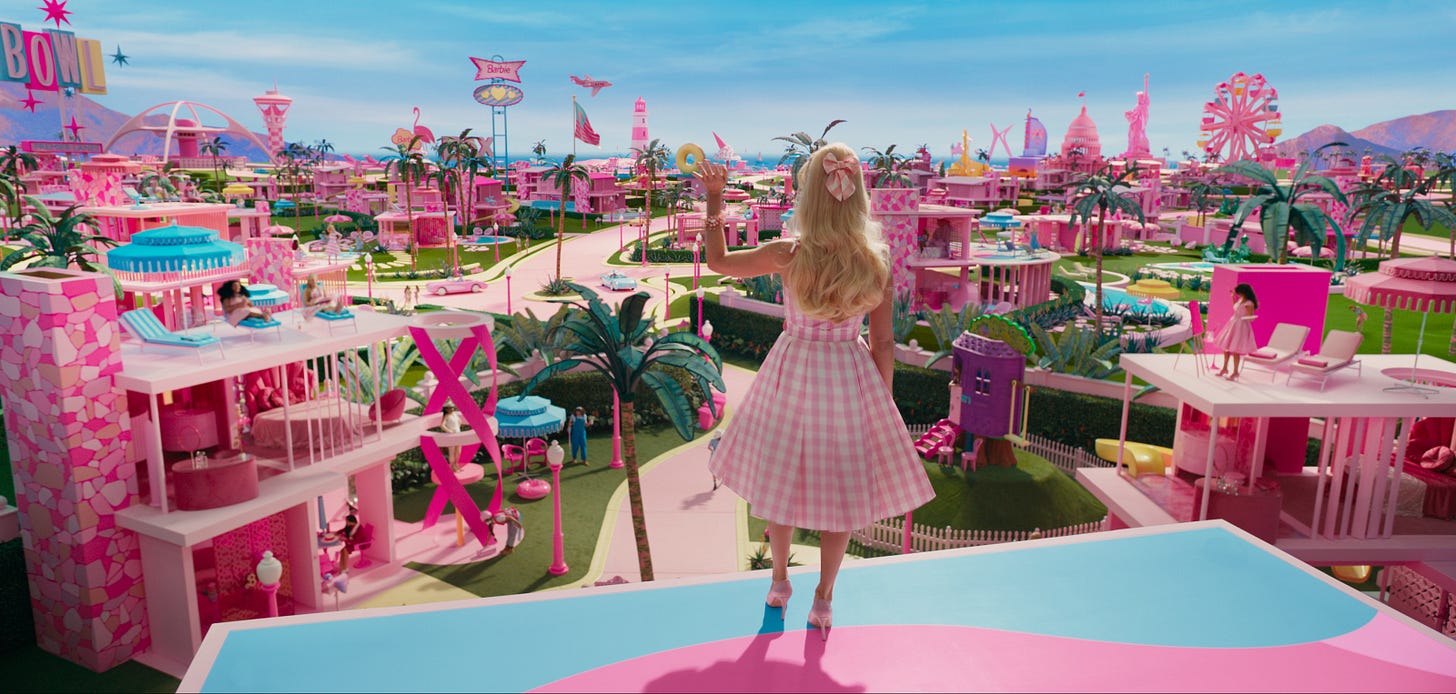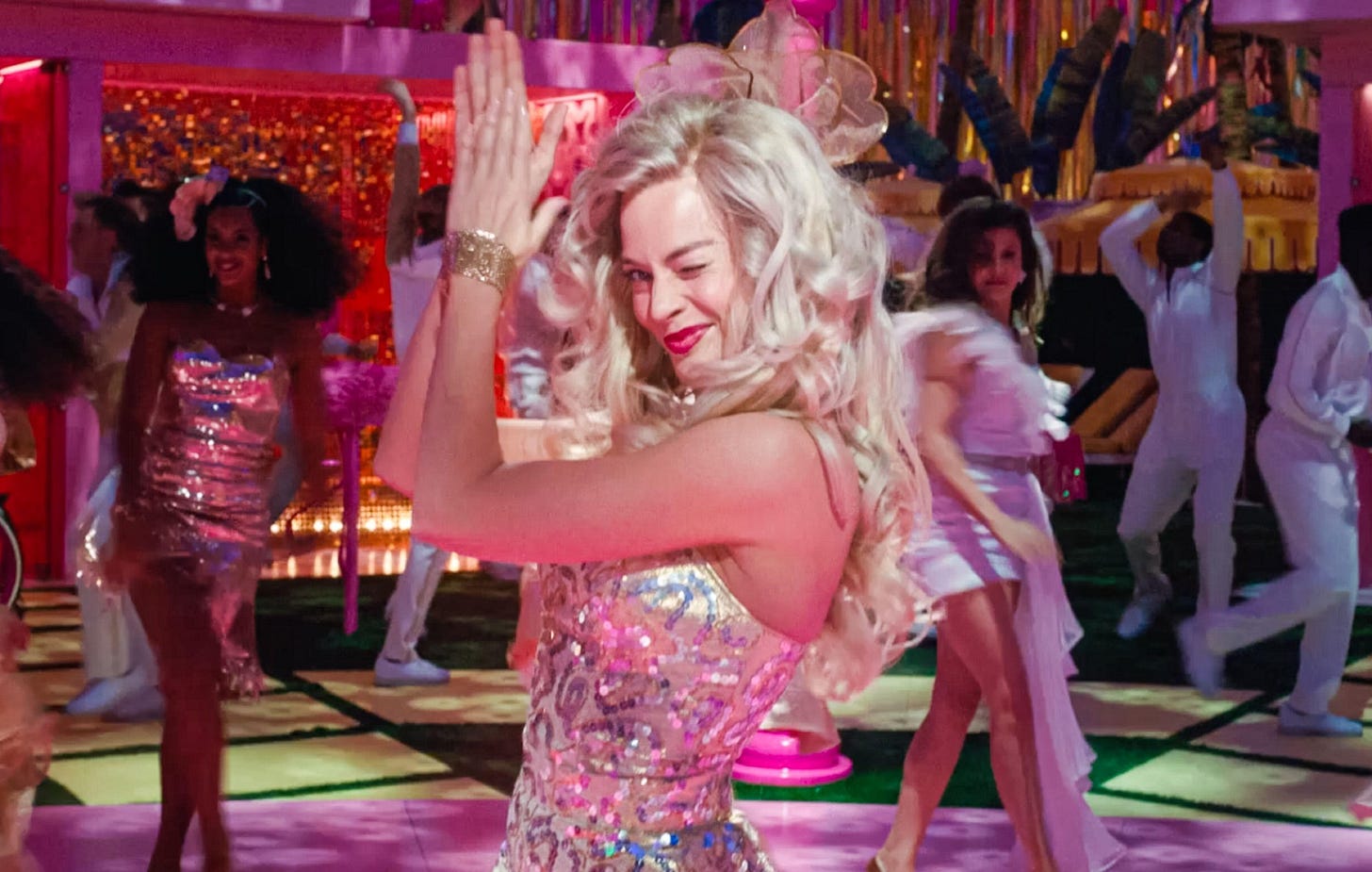Barbie (2023)

Movie rating: 9/10
I’ve never been more delighted by the simple process of buying movie tickets than last night when I finally got to live out the meme: “Two tickets to Barbie, please.”
As the producers of Snakes on a Plane and Morbius could tell you, popular memes don’t always translate to box office success. But Barbie is now clearly the movie of the summer. To date it’s earned more than $1.18 billion at the global box office, garnered rave reviews, and inspired the “Barbiecore” fashion trend. The pop culture phenomenon of “Barbenheimer” didn’t hurt (watch this site for my eventual review of Oppenheimer). Both Barbie and Oppenheimer have now reached the point where you pretty much have to see both to be part of the cultural zeitgeist. Of those two, I was more interested to see Barbie just because I had less idea of what to expect.
My verdict on the pink-hued blockbuster? I thought it was a blast. As expected, the movie’s perspective is firmly entrenched in bourgeois feminism. But in light of the cold commercial calculations inherent in making a movie like this—based on intellectual property (IP), in this case a toy—Barbie is incomparably better than it would have been without the guiding hand of Greta Gerwig as director. This is probably the most unabashedly feminist movie I’ve ever seen. Whatever you think about that, it’s all done in such a fun, appealing way, from the script to the performances to the music and stunning visuals and production design, that I think most viewers will just sit back and enjoy the ride.
Barbie represents the best melding of an auteur filmmaker with a popular IP since probably Christopher Nolan and Batman on The Dark Knight. When it comes to modern Hollywood, IP is king. As studios become ever more dependent on tentpole blockbusters with ever-higher budgets, so every approved script has had to be based on something audiences are already familiar with: existing IP such as a previously successful book, film, TV show, play, toy, amusement park ride, etc. Anything audiences are unfamiliar with is seen as an unacceptable risk.
Very few filmmakers have the power to make whatever movie they want based on an original idea. Nolan is one of those few, being able to make a movie like Oppenheimer with a huge budget and casting any actor he wanted (and even that film was based on a historical figure). Nolan got to that position by playing the IP game with his Batman trilogy. Gerwig is a director of similar talent and distinctive vision. Now she’s doing what Nolan did with The Dark Knight: using an IP as a springboard to say something meaningful. Where Nolan in that film used Batman and the Joker as a metaphor for the post-9/11 U.S. and the “war on terror”, Gerwig uses Barbie as an opportunity to provide meta commentary by examining the titular doll through the lens of the struggle against women’s oppression.
To say too much about the plot would spoil the surprises. But the story revolves around Stereotypical Barbie (Margot Robbie), henceforth known as “Barbie”, who lives in the utopian matriarchal society of Barbieland. In this world, Barbies (i.e. women) hold all important jobs and Kens (i.e. men) exist only to seek validation from the Barbies. Facing an existential crisis, Barbie embarks on a journey to the real world to find the girl playing with her, reluctantly allowing Beach Ken (Ryan Gosling) to tag along. Their experiences in the real world end up turning their lives, sense of reality, and perceptions of themselves upside down.
Gerwig shows here why she’s a masterful director, easily balancing different tones, keeping up the momentum, and garnering lots of laughs. She goes just far enough in terms of social commentary you could get away with in a big Hollywood blockbuster. Arguably in the third act, when a character speaks directly at great length about society’s conflicting demands on women, it gets a little heavy-handed. But most of the time it conveys its point of view through character development, humour, and dramatic moments when necessary. The opening scene inspired by 2001: A Space Odyssey, which also served as the film’s teaser trailer, is brilliant.
Gerwig aside, the MVP here has to be Margot Robbie, who basically carries the whole movie on her shoulders. She’s just the right mix of upbeat and vulnerable, and obviously looks the part. Robbie also produced the film, and has clearly been vindicated after pitching the film to Warner Bros. Discovery executives by saying it could make a billion dollars. Gosling makes for a hilarious himbo as Ken. While I think it’s going a bit far to say he steals scenes from Robbie, both of them are on their A-game. I also greatly enjoyed Gosling singing the power ballad “I’m Just Ken”. Along with the supporting cast, everyone onscreen looks like they’ve having a good time, and that sense of fun is infectious.
The production, set design, and costuming make the movie a feast for the eyes. Sarah Greenwood and Katie Spencer served as set designer and decorator, respectively, and they’ve convincingly brought to life everything from Barbie’s Dreamhouse to—well, any other accessories Barbie and Ken have sported over the decades. Barbieland somehow manages to be this surreal pink fluorescent world without ever feeling cheap, probably because it cost quite a bit of money to build all those sets. But it’s as fully realized a fantasy world as any other I’ve seen from Middle-earth to Wakanda.

One of the best things about Barbie is how it took what was at its heart a cynical cash grab—an attempt to exploit a well-known IP familiar to generations of women and boost profits for Mattel—and uses it to actually interrogate the complex legacy of Barbie as it’s affected women in the real world. Sasha, a tween girl Barbie initially believes to be the girl who plays with her, gives voice to critics when she accuses Barbie of promoting unrealistic beauty standards and setting feminism back 50 years, calling her a “fascist” to boot (Barbie, to her credit, notes through tears, “How can I be a fascist? I don’t control the railways or the flow of commerce”). On the other hand, Barbie does remind us that the doll promoted an image of women succeeding in any range of occupations, in effect telling girls they could do anything—a banal message now, but less so several decades ago.
Any serious examination of Barbie has to address the movie’s view of female emancipation, which is bourgeois feminist to the core. If there’s a feminist message to Barbie, it boils down to this: “Women (and men) can be whatever they want to be.” In Barbieland, as mentioned before, Barbies hold all the important jobs, while the Kens are just there to look good and find validation through their relationship with the Barbies. So in Barbieland, women are construction workers, doctors, and Nobel-Prize winning scientists. The president of Barbieland is a woman, as are all members of the Supreme Court.
If we were to ponder how the society of Barbieland actually functions—and yes, this is ridiculous, but bear with me—we would have to conclude that in Barbieland there is a state. The state only exists where there is a division of society into classes. Some Barbies get to be president and serve on the Supreme Court. Ohers do hard manual labour. Who decides what Barbies do what jobs? The existence of a state implies police, but interestingly, we don’t see any Police Barbies. I suppose that would spoil the illusion. Barbieland is a class collaborationist fantasy.
On the other side, the movie’s portrayal of “the real world” barely mentions class at all. Instead, the real world is depicted as a world where men hold all the power and the most important jobs, i.e. “the patriarchy”. But anyone familiar with the real world must allow that a male janitor has far less power than a male CEO, general, or Supreme Court justice. Class is simply not a factor in Barbie, whether in Barbieland or the real world—just as it is not in the worldview of bourgeois feminism, which celebrates the “girlboss”, female CEOs, and female politicians like Hillary Clinton while ignoring their exploitation and oppression of poor and working class people of all genders. That oppression is backed in the last analysis by violence, the “armed bodies of men (and women)” who make up the state and which are conspicuously absent in Barbieland.
At this point the reader might accuse of talking too seriously about this movie, which after all is about a doll. But the fact is that Barbie looks to be the highest-grossing film of the year, and has prompted many critical analyses which take seriously its feminist message. At this point we have to lay our cards on the table and explain the differences between the feminist perspective on women’s oppression and the Marxist perspective, which always centres the class question:
Marxists must energetically take up the cause of women, fighting against inequality and all manifestations of oppression, discrimination and injustice. But we must always do this from a class point of view. While fighting consistently for each and every reform that represents a real advance for women, we must explain that the only way to really achieve the full emancipation of women--and all other oppressed layers of society--is through the abolition of the capitalist system. This requires the utmost unity of men and women workers in the struggle against capitalism. Any tendency to play off women against men, or to divide and segregate off women from the rest of the labour movement in the name of "women's liberation" or anything else is thoroughly reactionary and must be energetically combated.
We fight for the sacred unity of the proletariat, irrespective of sex, race, colour, religion or nationality. Thus, our fight for the cause of women necessarily presupposes an implacable struggle against all kinds of bourgeois and petty bourgeois feminism. Such tendencies, where they gain influence in the labour movement, invariably play into the hands of the most reactionary elements, play a divisive role and sow confusion among those women who are moving in the direction of socialism. In this, as in all other questions, we must take a firm class position. As we have seen, the Bolshevik party and the Communist International in their resolutions always spoke of "working women" and not women in general…
The mere achievement of formal "equal rights" without transforming social relations, is extremely limited and leaves untouched the fundamental roots of the oppression of women in capitalist society. In the last period much of the supposed "improvements" related to "positive discrimination" have, in fact, served as a vehicle for the advancement of a layer of petty bourgeois careerists. In the last decade or so, the voice of militant petty bourgeois feminism, formerly so strident in its demands for "equality" (the right to have women priests, managers and so on), has got less and less audible. Why? Because, the middle-class feminists are largely getting what they are asking for.
The bourgeoisie has made a bit of extra room for female managing directors, judges, bankers, bureaucrats and priests. The promotion of women in middle management has risen from perhaps 4 to 40 per cent of the total over the past 20 years in the USA. 419 out of the Fortune 500 now have at least one woman on the board, and a third of them two or more. The biggest companies are far better at promoting women than those at the bottom end of the Fortune 500. So some women are doing very nicely. These bourgeois and petty bourgeois careerists were always in favour of the emancipation of women "one by one, commencing with myself".
That is why we were always implacably opposed to bourgeois and petty bourgeois feminism. It has nothing in common with the real struggle for the emancipation of women which can only come about by the overthrow of capitalism. Once these career women had solved their personal "problem" within the confines of capitalism, they were quite happy to forget about the 99 per cent of women who suffer the most dreadful oppression and exploitation, while the erstwhile "feminists" join the ranks of the exploiters… The ruling class can always make this kind of "concession" to a movement that does not threaten its rule in any way.
If the feminist message of Barbie is that women (and men) can “be anything they want to be”, that’s a nice sentiment, but one that completely ignores material reality. Women and men from wealthier backgrounds in the 21st century may indeed be able to pursue their dreams, be what they want to be, and whatever platitude you want to add. But what about the rest of us? What about the workers who are needed to keep society running, who perform all the most vital tasks, and produce all wealth? How can a woman “be anything she wants to be” if she needs to take care of her children and perform the “double shift” of domestic labour after working multiple jobs just to pay for rent, groceries, etc.?
While this burden tends to fall more heavily on women, one could say the same for working people of any other gender identity. Leon Trotsky once asked, “How many Aristotles are herding swine? And how many swineherds are sitting on thrones?” The difference between Barbieland and the real world is that in the real world, we need to satisfy our material need for food, water, shelter, clothing, etc. before we can do anything else. How does society produce for those needs?
There’s a scene early in Barbie where the main character enjoys breakfast, which means tipping a cup towards her mouth, but no coffee or tea actually comes out of the cup. She’s surprised in the real world when she drinks from a cup and tea comes out. In the real world, someone needs to grow and process tea, coffee, and all other food and drink. Those people are workers and farmers.
I could go on about the politics of Barbie. One thing I can conclusively say is that right-wing and liberal commentators like Ben Shapiro, Piers Morgan, and Bill Maher who complain that the movie is “anti-men” have only shown once again that they’re a bunch of coddled, overpaid crybabies. The movie pokes fun at men, and women, in a way not fundamentally different from comedians whose routines boil down to “Women are like this, but men are like this.” Scenes where the Barbies try to outsmart the Kens and appeal to their male vanity in a variety of ways—by acting helpless, by pretending they’ve never seen The Godfather, or inviting the Kens to play guitar “at” them—are funny and relatable. If you think that’s being “anti-men”, I have news: you are the overly sensitive snowflake here.
Barbie is an entertaining, well-made movie with great production values and performances. While I disagree with its bourgeois feminist perspective, I still have to commend the movie for addressing women’s oppression at all, where most blockbuster movies avoid sociopolitical issues like the plague. The movie offers a great start to serious conversations on that subject, while being fun as hell to watch. For that alone it earns a place in the upper echelon of Hollywood blockbusters.






